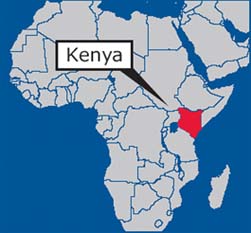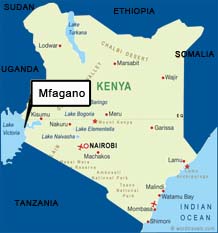


Le Kenya :
In the first few millennia Kenya was populated by nomads
who wandered the country. Contact with other peoples was sometimes the origin of conflict. In the 8th
century Arabs invaded the country and established trading posts. Boats brought cloth, wheat, wine and
other goods and left with slaves and ivory. India and China largely profited from this trading activity
carried out by Arabs.
From the 16th century, and for 200 years, Portugal took over this trade.
Slavery, which was very profitable for Europeans, eventually ceased after pressure from anti-slavery groups.
At the end of the 19th century England took advantage of the war against slavery to colonise Kenya.
It was not until 1956 that Kenyans won their independence.
There are 40 ethnic groups each with its own language, culture and traditions.
Today the economy of the country relies on tourism and agriculture.
The education system has made significant progress in the last few decades. Primary school
children study in Swahili, and in secondary school they learn in both Swahili and English.
Mfangano
This island is situated on Lake Victoria, a two and a half hour boat journey from the mainland, and
from where it is a further night bus to Nairobi. The 18,000 inhabitants live sometimes together in
small hamlets but are principally spread out across the island on family plots. Their houses are
traditionally made from a frame of wood with walls of mud and roofs of dried leaves. Some houses
have roofs of corrugated iron. Houses made from breeze blocks are rare because these blocks are
so expensive. Electricity arrived in 2010, but there is no running water. All washing whether it
is their clothes, their dishes or their bodies is done in Lake victoria. Some families own a few
animals (cows, goats, chickens). When the soil allows (according to the size of the plot and where
it is situated) they cultivate it. But the population lives principally by fishing which they do both
day and night. Their staple food is fish and ugali (mashed maize). The women cook using a fire close
to the house.
Unfortunately the current drought has hit them hard and the price of maize has soared.
People travel about the island by foot or by using taxi motorcycles. Although there is a daily ferry
service between the island and nearby mainland towns, the schedule is erratic and unreliable.
This difficulty of transport and the late arrival of electricity has not helped the development of
Mfangano.
